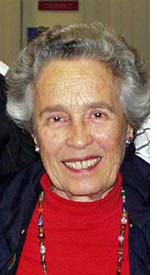By Eileen Wingard

SAN DIEGO — Conductor Murry Sidlin is well-remembered by San Diegans for his creative programs with the San Diego Symphony Orchestra. For many years, he was the conductor of the Classical Hits series. He also did a stint as conductor of the Summer Pops and, later, conducted the Light Bulb series.
Most of his programs included entertaining and informative scripts which he wrote himself. They served to convey the background of the music and enhance the audience’s aesthetic experience. His most impressive undertaking was “The Defiant Requiem,” a concert drama based on the story of the performances of Verdi’s Requiem at the Nazi show ghetto of Terezin in Czechoslovakia. “The Defiant Requiem” has been presented world-wide and the prize-winning documentary based on his performances in Terezin, itself, was shown at this year’s San Diego Jewish Film Festival. Sidlin was on hand to introduce the film and answer questions afterwards.
On June 11, the Simon Weisenthal Center honored Maestro Sidlin with a Medal of Valor because of his work in recreating “a powerful musical performance by Jewish concentration camp inmates.” Following is Conductor Murry Sidlin’s speech upon receiving the distinguished award:
By Murry Sidlin
*
Rabbi Hier, Mr. Katzenberg, members of the board and staff of the Simon Weisenthal Center, distinguished guests:
I am humbled by the honor you bestow upon me today and I accept the award also as a memorial to conductor Rafael Schachter, and the many Terezin artists who rest anonymously in unmarked graves. With every performance, every speech, every screening of our film, I assure them they have been heard, and we recall their artistry, spirit, courage, and dignity.
This has been my mission over the past 12 years since learning of their dedication: to illuminate the legacy of Terezin, the former Nazi concentration camp near Prague, where the Nazis intended to starve, degrade, deport to death camps or work to death 150,000 prisoners, almost all Jews. But instead, those unspeakable conditions inspired the prisoners to resist and fight back, not with improvised weapons, but on higher ground, with the arts and humanities, presenting nearly 1,000 concerts, and 2400 scholarly lectures. These concerts and lectures created a Terezin climate, an environment, a state of mind; a response to Nazi imprisonment which brought them the nutrition of abundant hope, infectious courage, a will to survive, a restoration of dignity, a recharged and reassured soul. This renaissance emerged from chamber music, choral music, cabaret, opera, and even jazz from The Ghetto Swingers, plus contemporary music from 4 major prisoner composers, as well as lectures on every conceivable subject: literature philosophy, medicine, Judaism, to cite a few.
Overseeing the creation of this cultural mecca, and especially the astonishing diversity and quality of music- making was my hero, my inspiration, Rafael Schachter who, after 2 years of nightly concerts, envisioned the logical outgrowth of all previous concerts. He recruited a chorus to learn to sing Verdi’s monumental Requiem Mass by rote; 150 amateur singers molded and unified into a chorus that we would be proud to present in any urban setting today. He could make every member of the chorus suppress awareness of hunger, fever, pain, and incessant terror. He would demand that they pay riveting attention to rehearsing, not because he was a merciless ego-driven conductor, but because he needed singers to lose themselves in the beauty and power of Verdi’s music, with which they were desperately consumed, reaching deeply inside the music to its origin, to Verdi’s desk.
Schachter gave this score a reinterpreted meaning: the Dies Irae, day of wrath, was now sung to the Nazis about THEIR fate and the prophesy that when the Judgment comes, nothing will remain unavenged. Schachter knew that when passion is greater than our ability to express it in common language, that is the point at which art can begin. Art gave them grounding, a port of respite against the unstoppable insanity of the European occupation.
The Defiant Requiem Foundation tells this story through our 4 dimensions: the Defiant Requiem live concert drama, our documentary film, the Schachter Summer Institute, and several education programs, soon to add the Terezin Remembered University Residency Project. I was compelled to illuminate this story, for clearly their art was both soothing balm and sharp sword in their determination to survive. I had to bring this story to life to explore it relative to current oppression and threats of genocide.
I shall continue to strive to be worthy of your recognition as I serve the memory of Rafi Schachter and the legacy of arts and humanities at Terezin. In the immortal words of the great cardiologist Ludwig van Beethoven, from the heart, may it go to the heart.
Thank you.
From Murry Sidlin
Thank you, Eileen. I’m very grateful.
Murry